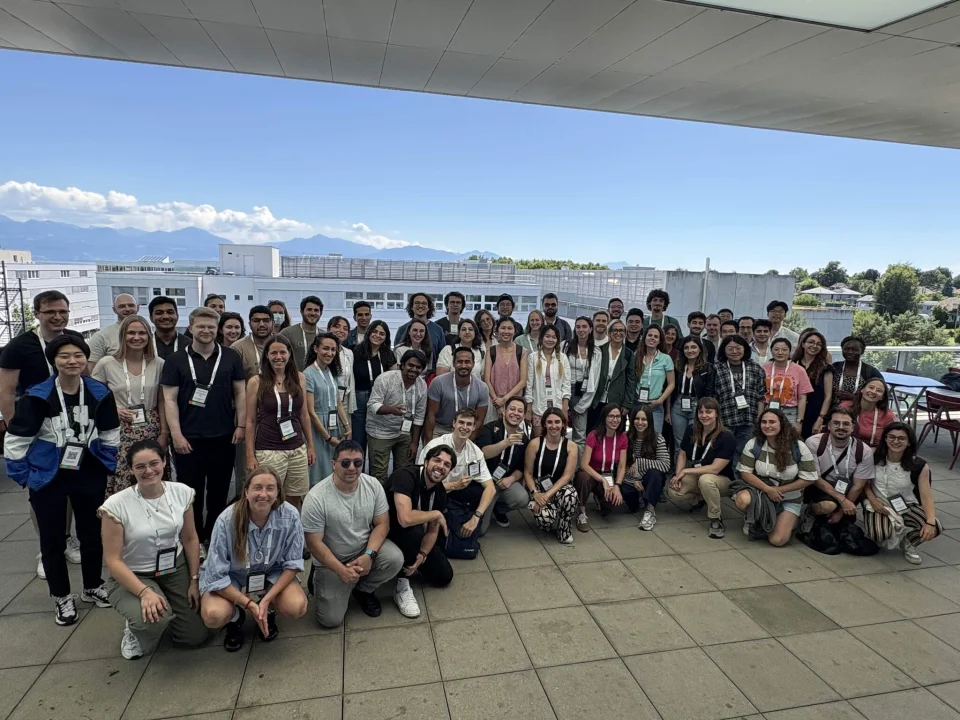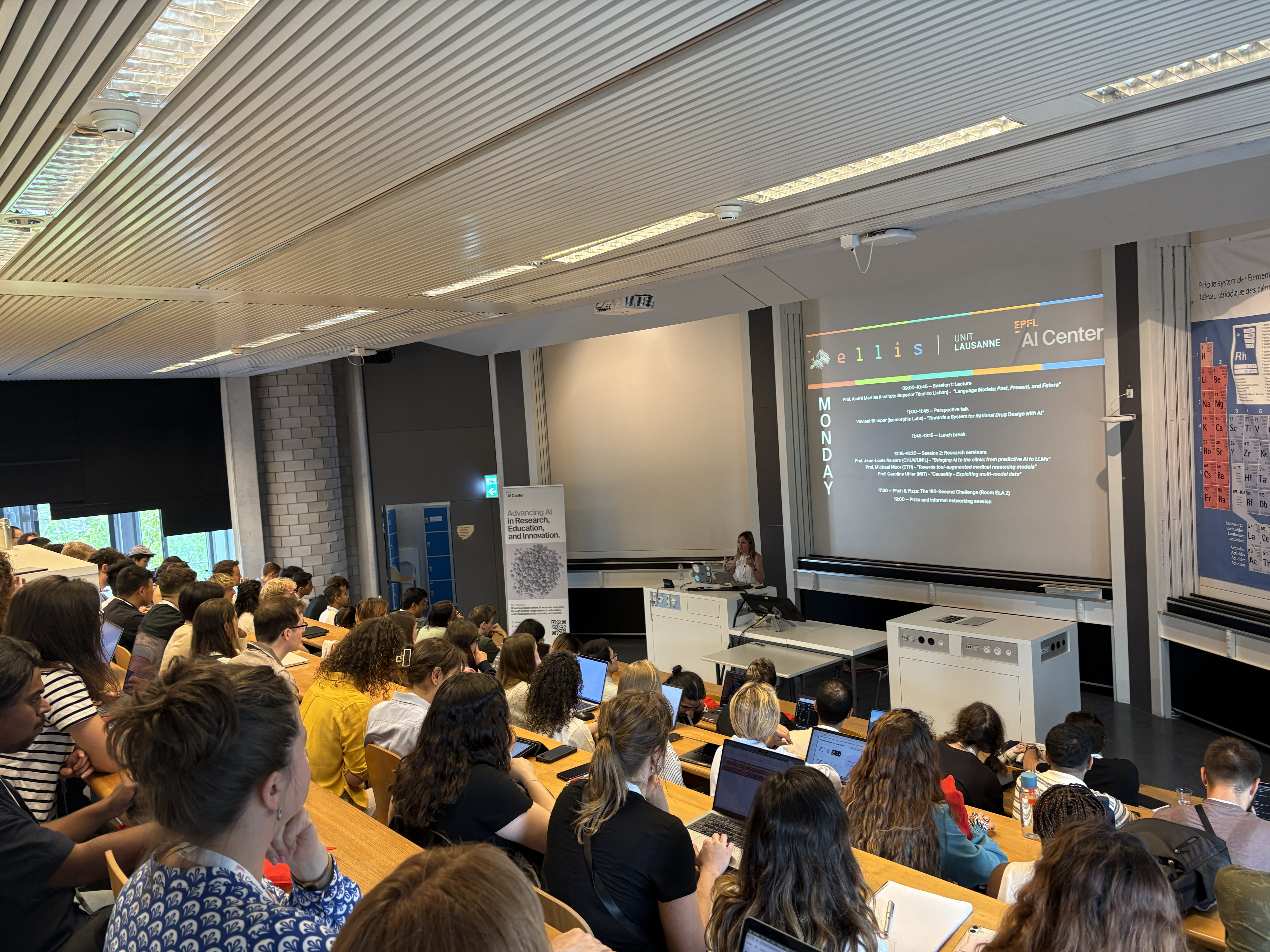



ELLIS Unit Lausanne: AI for Health Summer School 2025
Participants and Programme
The summer school, jointly organised by ELLIS Unit Lausanne and the EPFL AI Center, brought together around 70 Master’s and PhD students to explore a range of topics in AI for health. The programme included lectures by well-known researchers and practitioners from diverse backgrounds, addressing both current developments and practical challenges in applying AI to biomedicine, while also offering opportunities to revisit foundational concepts and explore recent advances in AI. A hands-on workshop gave the students the opportunity to explore advanced LLMs applications and multi-agent systems.
Key Takeaways from the Talks
The overarching takeaway message of the summer school was clear: AI is reshaping medicine and driving biological discovery. While access to data and heterogeneity across datasets remain a significant challenge, as highlighted by Dr. Jonas Richiardi (CHUV / UNIL), federated learning could provide a promising framework to enable collaborative model training across institutions while preserving data privacy and respecting regulatory constraints.
Understanding the underlying mechanisms is critical in biomedical sciences and Prof. Caroline Uhler (MIT) showed how multimodal learning can help reveal the underlying causal model. Participants also examined how large language models and intelligent agents could be used to integrate complex biomedical data for personalised medicine. Looking ahead, the expected rise of multimodal language models - particularly with the inclusion of video - will require more sophisticated approaches to handle context, a point emphasised by ELLIS Fellow Prof. André Martins (Instituto Superior Técnico Lisbon).
The programme further addressed advances in generative AI, such as diffusion models, with promising applications in DNA sequence design and synthetic biology. Virtual tissues and virtual patients are expected to play a key role in personalised medicine as pointed out by Prof. Charlotte Bunne (EPFL) and Prof. Marianna Rapsomaniki (UNIL/CHUV). The students further explored the use of graph machine learning to model biological networks with a wide range of applications discussed by Prof. Pietro Lio (University of Cambridge, ELLIS Fellow) and Dr. Dorina Thanou (EPFL, ELLIS Scholar).
Across these technical areas, Prof. Jean-Louis Raisaro (CHUV / UNIL) emphasised the importance of ensuring that AI in healthcare addresses relevance, fairness, and responsibility, rather than focusing solely on performance metrics.
“Beyond optimising algorithms, your role is to co-create solutions with those who live with the problems every day: clinicians, nurses, patients, caregivers.”
Insights from Participants
For many participants, the lectures provided both direct input for their current research and inspiration for future projects. As ELLIS PhD student Animesh Awasthi (CeMM, AI Institute at the Medical University of Vienna) reflected:
“My personal most important takeaway came from the generative AI session, where we explored how foundation models can be adapted for single cell transcriptomics and genomics. It inspired me to think about applying these to my research on enhancer benchmarks and multi-objective optimisation in DNA sequences, potentially accelerating discoveries in gene therapy.”
 (The Summer School's co-organiser and ELLIS Scholar Dr. Dorina Thanou (EPFL), kicking off the week in the lecture room)
(The Summer School's co-organiser and ELLIS Scholar Dr. Dorina Thanou (EPFL), kicking off the week in the lecture room)
.jpeg) (Dr. Fulvio Michelis (Merck Group) giving his presentation on “AI enhances value generation in ecosystems around the drug”)
(Dr. Fulvio Michelis (Merck Group) giving his presentation on “AI enhances value generation in ecosystems around the drug”)
Informal Exchange and Social Activities
Beyond the lecture programme, the event incorporated structured opportunities for informal interaction, contributing to the exchange of ideas and the formation of collaborations. Social activities included short-format research presentations, guided tours of Lausanne, visits to the Olympic Museum, and group gatherings at local venues. The week concluded with a farewell barbecue, after which participants initiated informal online groups to maintain contact and explore future collaborations.
Impact of Summer Schools
Summer schools of this format provide early-career researchers a concentrated way to become familiar with a wide spectrum of scientific topics in a short time. This does not only support work within one’s main research focus but can also inspire new ideas and directions.
The full programme is available at ELLIS Unit Lausanne Summer School 2025.
Academic Partners & Sponsors
The organisers gratefully acknowledge the support of the following academic partners and sponsors:

